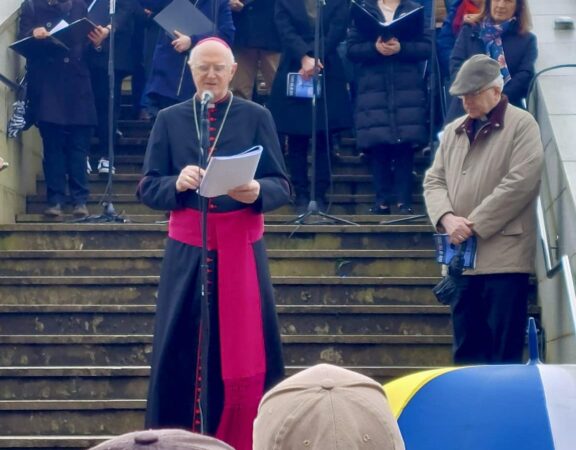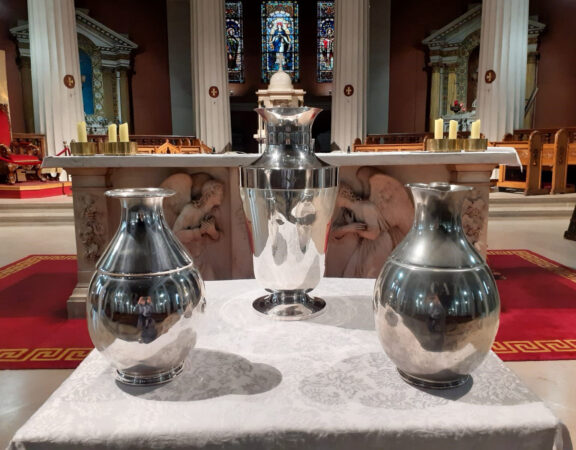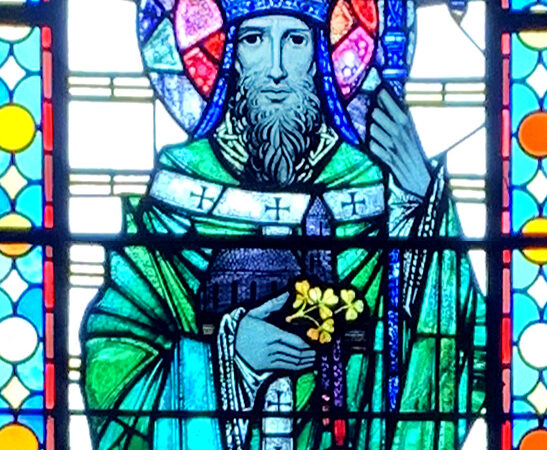CATHOLIC SCHOOLS WEEK 2013 Homily Notes of Archbishop Diarmuid Martin, at Church of Our Lady’s Nativity, Leixlip, 31st January 2013
“I am very happy to celebrate this Mass for Catholic Schools Week on the Feast of Saint John Bosco, who is considered by the Church, Patron of Educators and the Apostle of Youth. His entire life was inspired by the thoughts contained in the Gospel reading we have just heard. The Gospels stress that reflection on childhood is the key to help us understand the kingdom of God. This means that how we treat children indicates something of our understanding of the kingdom of God. To fail children is to betray the kingdom of God.
Don Bosco was a huge figure whose impact spread right around the world. He became a priest against the wishes of some of his family and from the first moments of his work in a parish he began to address the needs of young people. His approach was different to that of the times, where school was a place of conformism and discipline. He felt that education should be inspired by love and trust.
His was a method which was not always easy to put into practice. Don Bosco began to gather the young people of his parish into a sort of youth centre only to find that his method of love over discipline landed him in trouble with the neighbours and then with the police due to the noise that the young people were causing in the evenings. He was forced to close his centre. What did he do? He simply moved on to another place and continued in his work. No one was going to undermine his faith in young people.
Don Bosco knew his young people and he knew that education was not about forcing young people to fit into predetermined patterns. Education was about enabling each unique boy or girl or young adult to become fully the person that God wanted them to be. He realised that that might even mean – indeed, might inevitably mean – that his young people could be noisy and upset the tranquillity of established habits, but that did not deter him.
We celebrate Catholic Schools Week under the theme: Catholic Schools in the Community of Faith, Sharing the Good News. I am delighted to celebrate this Mass in a community like Leixlip in which there are four primary schools and one post primary. What is important, however, is not numbers, but the fact that Leixlip is blessed with good schools. The presence here today of a representative group of parents, boards of management, teachers, pupils and the parish is witnesses to the fact that good schools flourish when they belong within and form part of a wider community.
I believe, and I have said it on many occasions, that this is a great time to be involved in education. It is a great time for all those involved. There are indeed many challenges. The noisy children of the time of Don Bosco have given place to the boys and girls and young adults of our times who – together with parents and community – are justifiably noisy in crying out in today’s language to receive the best in education. The way forward is together.
On this Feast of don Bosco, I cannot help remembering a visit that I made to a huge technical school run by the Salesians of Don Bosco in East Timor, during the struggle for independence. East Timor was one of the poorest countries in the world. One sign of hope was this was a technical school, with the classic disciplines of woodwork, mechanics, electrical and other skills. In one area I found children repairing telephones. Unfortunately what they were working on was a type of telephone that was already out of date and no longer in use even in a developing country. Next door, however, there was a group of children enthusiastically working on three computers which had been given to the school by the New Zealand Embassy. These children had entered into a different world, using not just new techniques, but beginning to find access to a world way beyond their own.
Education is not just about techniques and information. It is about using progress to open horizons, allowing children to explore new horizons and to push their horizons in new directions, even beyond the immediate context which surrounds them.
The Catholic School should indeed be a pioneer in this field because faith in God is not something that makes people conservative or closed or traditional. Faith opens us out beyond human horizons. It should offer a yearning for knowledge, but also a yearning for goodness, truth and love which chan ges people. When faith leads to conformism it has betrayed the very nature of faith. Conformism falsely feels that it has attained certainty. Faith is always a leap into the unknown and a challenge to go beyond our own limits and our own narrow certainties.
Catholic education must involve bringing out the best in people but also in going beyond individual limitedness, leading to a sense of relationship and responsibility. When Catholic Schools Week speaks of community it means that education belongs and takes place within a community but also that it brings its fruits back into the community
I say to the young people here today to remember that, as you look at your life choices, do not just think in terms of making money quickly, but about using your God-given talents to create a future that is different, a future based on sharing and responsibility. Science, in fact, is not just about exploring knowledge but also about ensuring that the fruits of knowledge are shared for the good of the human family.
Our future as a society needs an injection of youthful enthusiasm and creativity. The traditional caring professions need that injection. The Church badly needs that injection. We need young people prepared to become involved in professional life, in the public service, in finance or in business, inspired by justice and honesty and equity. We need that sense of idealism also because my generation has often failed.
When I think of serving the community with a vision of life, I am struck by the tragic events these days and just how vital the social role of an Garda Síochána is and of the enormous respect and esteem that the Gardai enjoy in our society because of their uncompromising dedication, integrity, care and courage. We remember them in our prayers.
Education can never be just about myself. Education is always about education in relationship and responsibility. It is education to take one’s place responsibly in community.
Today the nature and the demography of Irish society are changing. The culture of today’s Ireland is changing. In this more pluralistic society, educational policy has to find new ways to foster both diversity and inclusivity. This is a challenging task. Simple uniformity fosters neither diversity nor true inclusivity.
Catholic Education must find its place today within a more pluralistic society. It must adapt to the changing society but never abdicate its specific role. Denominational education is a valid pillar of our future educational system. Government has a responsibility to foster the desire of parents who wish for denominational education but all those associated with denominational education must also ensure that the education offered in our Catholic schools is of the highest level.
Sharing the Good News of Jesus Christ is the essential pillar of Catholic education. The Catholic school – to bring its original contribution to society – must be allowed then to be truly Catholic. People who are strong and mature in their own religious identity are the ones who are best able to live within and foster diversity and dialogue. Insecurity about ones faith is at the root of fundamentalism.
It might seem to some a paradox if I say that Catholic education will only survive in the Ireland of the future in the robust presence of other forms of education. We have been speaking about a greater pluralism in patronage but I sometimes feel that there exists within parts of our Catholic education system a hesitation to let go or to feeling that somehow Catholic patronage can provide within its own structures the necessary pluralism required in society.
We need the courage of Don Bosco who was not upset when the noise of his children upset the tranquillity of his villages. Education is about daring, it is about enhancing. Catholic Education must be an expression of real trust in young people. It is about respecting young people and respecting childhood. Education is not about creating premature adults modelled on our own preconceived ideas, but of appreciating what childhood is about, that unique moment in each life childhood which mirrors and reflects the kingdom of God. ENDS









